Where Hearts and Minds Unite
On the last morning of September last year, before the sun had even risen, I set off with my suitcase on a journey from Shanghai to Shifang Town in Longyan, Fujian Province.
Just like the hot weather at that time, my feelings were also fiery and excited: I didn’t know what the children I was about to meet would be like, what the environment where I would live for a week would be like, nor did I know what challenges I would face. This uncertainty made me feel thrilled. What kind of experience was waiting for me?

A Journey of Heart and Knowledge
After a whole day’s journey and several transfers, I finally arrived at Shifang Town in the evening. Teacher Lin, one of the founders of the Shifang Public Library, and her family met me at the highway exit to bring me into this quiet town nestled in the hills of Fujian. Teacher Lin’s warm hospitality swept away my fatigue, making me feel warmly welcomed. After dinner, Teacher Lin took me to the Shifang Public Library, where I learned about some of the basics of the library. While I was there, I became even more aware of the expectations and responsibilities resting on my shoulders, and I was more eager about the teaching that was about to start. The children were using their holiday time to attend English classes, and I couldn’t let them down! Back at the hotel, I opened my laptop and repeatedly went through the teaching materials provided in advance by the preparatory team, getting familiar with the content and contemplating what tomorrow’s class would be like, unconsciously making some assumptions and imaginations about the children’s responses and performances.
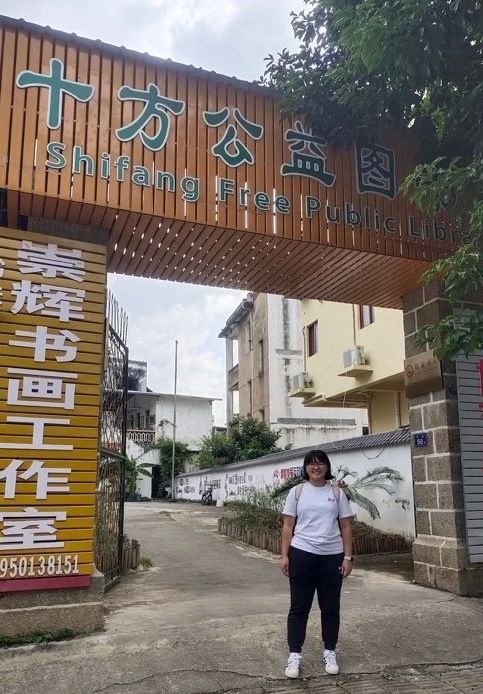
The Power of Language Education
The next morning, I arrived at the library ready to start the first day of teaching. As class time approached, the students from grades three and four arrived at the library, some playing and full of energy, others quietly reading with focus. When class began, I introduced myself, established some classroom rules, and asked what they thought might be different about this English class from others they’ve attended. I expected answers like “We can choose our own seats!” or “There’s no homework!”, but was surprised when several children said loudly, “This class is free, we don’t have to pay!”. This unexpected response made me realise that these children might see the world quite differently from what I had imagined. What other surprises were in store for me?
Teaching the first class of 25 third and fourth graders didn’t go as well as I hoped. The prepared materials were either too difficult, something they had already learned but not mastered, or something they knew well. Despite telling the students that I would speak only English and they could ask for explanations if they didn’t understand, the full English instruction proved too challenging for them. The same issues arose with the fifth and sixth graders, where the content was not suitable, and the students were afraid of speaking English.
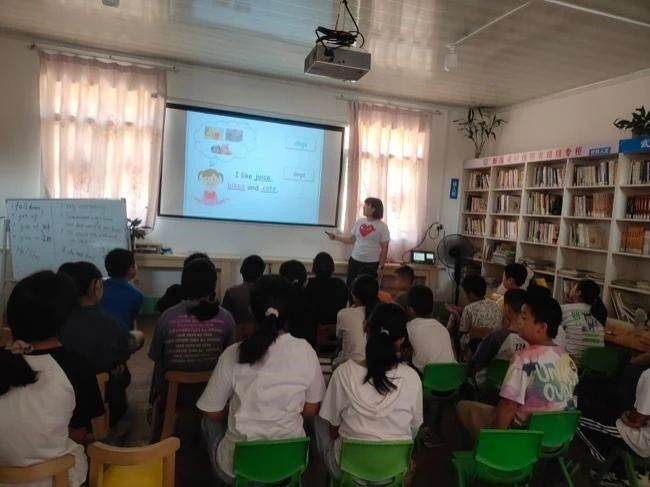
The children were very cooperative during the morning’s teaching and also tried to actively interact with me and were curious about my age, they were surprised to find out, “You’re the same age as my brother!” The parents who brought their children were also enthusiastic. One parent excitedly introduced their two children and discussed their English learning progress. But the mismatch between the teaching content and the actual situation, exceeding expectations, made me realise that I need to put more effort into preparing classroom content! With only a week’s time, how could I make the most of it to ensure the children gained something valuable and that the impact lasted? I realised it’s unrealistic to expect the children to learn a lot of information thoroughly in such a short period. Instead, my hope was that through this week’s lessons, the children would be exposed to things they may have never encountered before, fostering an increased interest in English. I aimed for them to maintain their enthusiasm for learning English after this week’s courses concluded, becoming more confident in speaking and using the language.
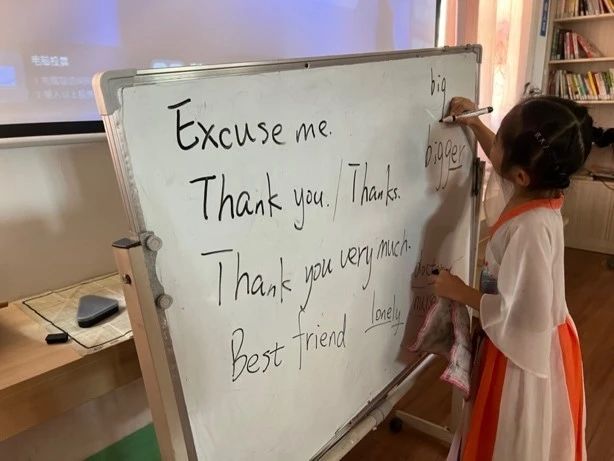
Starting from the second day of classes, I began playing English songs or clips from English movies or cartoons before class, encouraging everyone to greet each other in English. Based on the situation from the first day, I adjusted the lesson content. For topics that were unknown or unfamiliar to the students, I repeated them several times in English before explaining them in Chinese, encouraging the students to speak English without fear of making mistakes. I replaced parts of movies and videos with English songs and video clips that the children wanted to watch, such as “Zootopia”, “Peppa Pig” and “Harry Potter” from which I extracted words and phrases the children could understand and taught them. With specific contexts and daily reviews, the children gradually mastered the newly learned content. Beyond the main course material, I shared about the cities where I have lived and studied, and some experiences from university in English. I also connected with two of my friends who recorded videos in Chinese sharing their experiences of learning Chinese, encouraging the children to learn and speak English. We spent some time in class making video calls, allowing the children to interact directly with them, which excited everyone. During this process, I received some unexpectedly amusing questions and answers, such as “What language do Americans speak? Is it American English?”, “Why are this brother and sister so pale?”, “I don’t want to go to Guangzhou because it’s too hot!”. I also heard some delightful responses, like “Do you like learning English? Yes! Because it’s fun!”
Laughter and Echoes of Learning
After a week of classes, I could feel everyone’s focus in the classroom intensifying, with more greetings like “Good morning!”, “See you!”, “Bye!” heard before and after class. I heard more children singing the songs we learned, eagerly helping me wipe the blackboard during breaks, and bombarding me with all sorts of questions, including more and more inquiries about English, such as “Teacher, how do you read this word?” or “How do you say this?”… Although the content taught was much less than initially planned, the various small changes in the children filled me with immense joy! Outside the English lessons, I also felt the children’s enthusiasm.
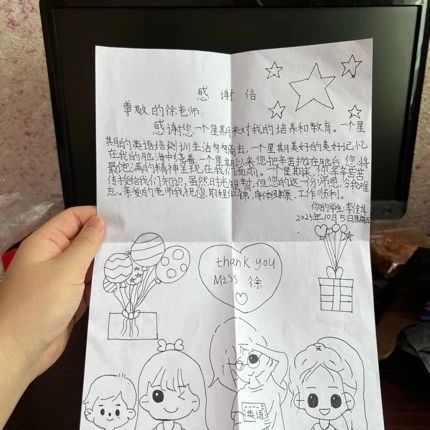
Every day, I could hear them saying to me, “You must come back again! I’ll take you to try out our local food! Bring your friends too!”, “Will there be more English classes in the future?”, “You must come during the winter vacation!”, “Next time you don’t need to stay in a hotel, you can live at my house!”, “You can stay at mine too!”… The children also promised me they would continue to study hard and learn English well! The warmth and hospitality from the children and local residents deeply touched me. A week might not be long, but it was enough to forge connections and build deep bonds!
Memories of Parting and Gratitude
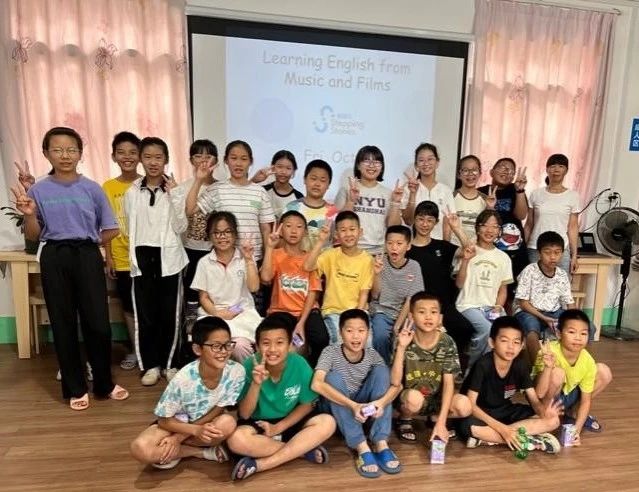
A week flies by in an instant, and as the bus leaves Shifang, it felt like waking from a dream to return to reality, bringing a sense of reluctance and a feeling of disconnection—this week was truly wonderful!Throughout my week in Shifang, everyone mentioned how a girl came all the way from Shanghai to teach English to the children without any salary, acknowledging the difficulty of this task. Teacher Lin also shared with me the continuous expressions of gratitude from parents in their group chats. However, compared to what I contributed this week, I felt that Shifang town, the children, Teacher Lin, the librarian, and other local residents gave me so much more. While I showed them something different, they in turn showed me many different aspects of life, filling me with endless warmth. The lifestyle of the small town also opened my eyes to another possibility of living, presenting me with various definitions of happiness.
On my way back to Shanghai, the past week’s moments replay in my mind like a slideshow, with the voices of the children and their smiling faces intermittently appearing in my thoughts. I’m not sure how much the children felt they learned in this week’s English lessons, how many words, phrases, and sentences they can remember, or if they will recall the things I said in class. Nor do I know if they will remember me, their library English teacher, in the future, or if I truly showed them a different aspect of the world, exposing them to new things. But I believe the warmth we shared during that week will not fade; the children’s smiles were genuine, and all these are part of the impact. Perhaps I don’t currently have enough energy to support rural education over the long term, but I think every bit of warmth and every smile passed on will positively impact the children, as the power of education is far greater than we can imagine.
